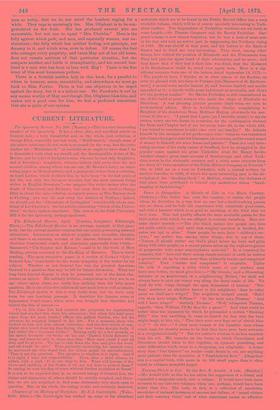The Edinburgh Review, April. (London, Long-man; Edinburgh, Black.) — The Edinburgh Review
is an average example of that quar- terly, but the current number contains but one article possessing unusual attractions. Information on subjects popular and recondite abounds, and there is an amusing account of the famous German novel which sketches Continental courts and statesmen apparently from within- Samarow's "Um Szepter und Kronen "—said to be the work of Herr Meding, private secretary to the Ex-King of Hanover. That is worth reading. The most attractive paper is a review of Cooke's "Life of General Lee," remarkable for the warm sympathy of the writer for his subject. Whether or not General Lea was the greatest American General is a question that may be left for future discussion. What has long been beyond dispute is that he possessed one of the finest cha- racters on record. His military abilities, conspicuous as they are in an age where many shine, are really less striking than his lofty moral qualities. He is one of the few soldiers all men mast love as well as admire. The Edinburgh sketch of him is very fairly done, but we have only room for one touching passage. It describes the famous scene at Appomatax Court-house, when news was brought that Sheridan had barred the lino of retreat :— " Up to this time Lee had resisted the proposals for capitulation which had reached him from his adversary ; but when this fatal news came from his most trusted officer, the gallant Gordon, who led his advance, he resigned himself to his fate. For a moment, those who looked on him saw him almost overcome ; and the first words of com- plaint ever heard from his lips during the war broke sharply forth, had rather die a thousand deaths !' Musing sadly for a few seconds, as his men's favourite cry broke on his ear, 'There's Uncle Robert!' in deep, sad tones he said to those near him, 'How soon could I end all this, and be at rest. 'Tis but to ride down the line, and give the word, and all would be over.' Then presently recovering his natural voice, he answered one who urged that the action might be misunderstood, 'That is not the question. The question is whether it is right. And if it is right, I take the responsibility.' Then, after a brief silence, he added, with a sigh, It is our duty to live. What will become of the wives and children of the South, if we are not here to protect them ?' So saying, he sent his flag of truce without further hesitation to Grant." It is not to be expected that in an avowed eulogy of General Lee, the claims and characters of others should be strictly weighed, and there- fore we are not surprised to find some statements very much open to question. But, on the whole, the eulogy is fair, and certainly deserved.


































 Previous page
Previous page